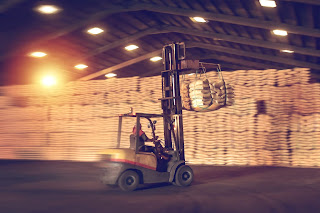Benefits of lithium-ion powered material handling equipment
Electric vehicles or EV have become a new
standard for innovation across various industries, especially material
handling. Apart from having environmental benefits, they have shown tremendous
success with heavy-weight applications and quite promising results for the long
run.
Every material
handling equipment manufacturer today offers electric options for a variety of
equipment like electric stackers, electric forklift and electric reach truck.
With the rapid advancements battery technology, electric vehicles are becoming
more and more reliable. In this process of developing the best-performance
battery, lithium-ion has taken the lead over lead-acid batteries. Lithium-ion
technology has demonstrated humungous potential in terms of performance,
cost-savings and sustainably.
The success of the lithium-ion battery is
what motivated Elon Musk to step into the world of Electric Vehicles. It sets a
remarkably high benchmark in terms of electric batteries can do and how they
can make it easier for humans to adapt EVs. That being said, the world of
material handling stands to benefit from EVs in a variety of applications like electric
forklift, electric stacker and electric tow trucks. And with
the latest advancements in lithium-ion batteries today, the market offers one
of the best electric-equipment line-ups ever.
Here are 5 benefits of using lithium-ion
powered equipment
1.
Opportunity Charging:
This is one of the biggest
advantages of lithium-ion batteries. Opportunity charging is a system that
permits batteries to be charged several times during the work, allowing one
battery to remain in the vehicle for much longer.
2.
Safety:
Lithium-ion batteries are
extremely secure against inflammation, leaks and overheating due to which, they
are not as hazardous as lead-acid batteries for workers. Lithium-ion batteries
can operate in extreme conditions, without imposing any dangers to the workers
as there is no toxic lead or sulphuric acid in it.
3.
Cost savings:
Lithium-ion batteries are
becoming more and more cheap to manufacture. Apart from that, lithium-ion
batteries have a longer lifespan and are up to 30% more energy-efficient than
lead-acid batteries. This all-together, along with low maintenance costs, make
lithium-ion vehicles very cost-effective. By 2021, it is expected that the cost
of lithium-ion batteries will be 43% lower than the current cost.
4.
No battery room requirement:
Regular lead-acid
batteries take up a lot of time for charging due to which, separate room/area
is required to store spare batteries and charge them up.
5.
Higher Sustained Voltage:
One of the biggest drawbacks
of lead-acid batteries is that they lose out voltage or power throughout the
day, even when they have plenty of charge left. That means your forklift will be
sluggish and less responsive. Lithium-ion batteries face no such issues and can
maintain optimum power throughout the charge.
Linde India is a premium brand in material
handling equipment and is one of the leading electric stacker
manufacturers. Industrial trucks by
Linde; whether diesel lift trucks, electric forklift trucks or warehouse
handling equipment, stand out because of their innovative technology aimed at
greater cost-effectiveness in logistics. Linde Material Handling offers
expertise in material flow and carefully conceived functionality combined with
maximum economy. If you are looking material handling equipment dealers or
prices in India, you should definitely check out their website- lindemhe.com

Comments
Post a Comment